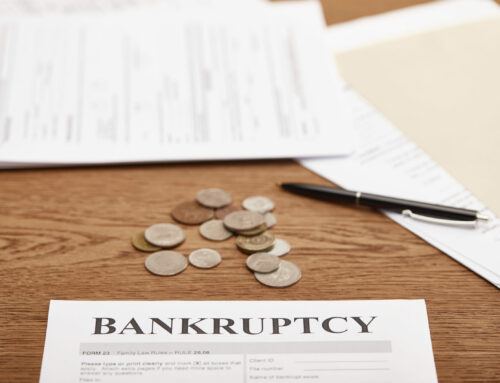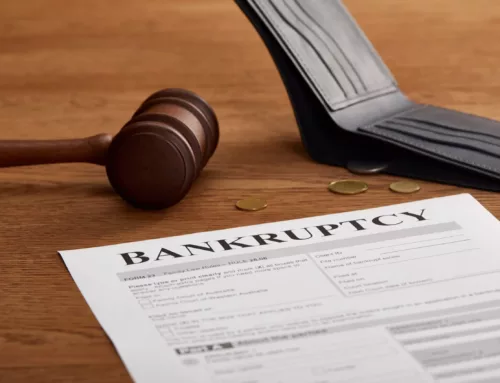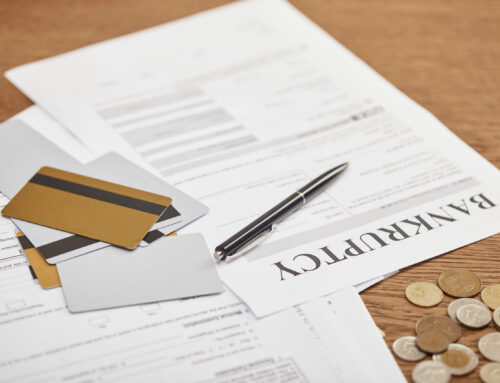Drowning in Debt? Chapter 7 Bankruptcy in Michigan Might Be the Answer
Are you struggling with a lot of debt and thinking about using Chapter 7 bankruptcy in Michigan as an option? Deciding to file for bankruptcy is a big step. It needs careful thought about your financial situation and what lies ahead. In this article, we’ll explore whether Chapter 7 bankruptcy is the right move for you.
Chapter 7 bankruptcy is a process for individuals to eliminate unsecured debts. It provides a fresh start by liquidating assets. In Michigan, Chapter 7 bankruptcy in the state follows national bankruptcy rules. Michigan has its own special rules and steps for this type of bankruptcy. So, what exactly is Chapter 7 bankruptcy in Michigan, and how does it work?
Quick Summary:
- Chapter 7 bankruptcy is “liquidation bankruptcy.” It eliminates unsecured debts in Michigan.
- The whole process usually takes 3-6 months. During this time, you may need to sell things that are not protected by laws to pay off people you owe money. However, you can keep important things like cars and household items safe from being.
- Qualifying for Chapter 7 depends on income. It discharges most unsecured debts. Decisions about secured debts, such as mortgages and car loans, must be made.
- Michigan Exemptions: Michigan offers a choice of federal and state exemptions for asset protection. This includes homes, cars, retirement funds, personal belongings, and certain benefits.
- Considerations: Before filing for Chapter 7, weigh benefits like debt elimination. Be aware of drawbacks such as credit score impact and loss of assets.
- Alternatives to Chapter 7 include debt management plans or Chapter 13 bankruptcy. These options are chosen based on personal financial situations.
- Property Protection: Michigan’s rule protects your main home. You can keep it if the value is low and you’re paying your mortgage on time.
- Filing Frequency: Filers have to wait eight years after a Chapter 7 case before filing for another discharge. This rule is set by bankruptcy laws to stop system abuse.
What is Chapter 7 Bankruptcy in Michigan?
Chapter 7 bankruptcy, or “liquidation bankruptcy,” eliminates unsecured debts for individuals and businesses. It offers a fresh financial start. It gives you a chance to start fresh through discharging unsecured debts like medical bills and credit cards. Some assets may be sold to repay creditors by a trustee appointed by a court. Michigan law exempts essential items like your car and household belongings.
However, qualifying for Chapter 7 depends on your income. If you have disposable income to make payments under a Chapter 13 plan, Chapter 7 might not be an option. The good news is that the Chapter 7 process is typically completed within 3-6 months.
Here’s a breakdown of what to expect:
- Selling Assets: In some cases, non-exempt assets might be sold to pay creditors.
- Discharging debts: Eliminate most or all unsecured debts. This is the primary benefit.
- Keeping Exempt Property: Michigan law helps you keep your important assets which are listed as exempt property so you can start fresh with the assets you need.
- Secured Debts: You have options for secured debts like car loans. You can give back the car or keep paying with permission.
If you are thinking about filing bankruptcy, seeking help from a skilled bankruptcy lawyer is advisable because they can guide you through these choices to see if Chapter 7 is best for your finances.
How Does Chapter 7 Bankruptcy Work?
Bankruptcy is a federal procedure. The main steps in filing and how the debts are cleared are similar nationwide in the United States. However, Michigan plays a role in two key aspects of your bankruptcy case:
- Michigan Exemptions: These are the rules that determine which property you get to keep during bankruptcy. Michigan allows you to choose between federal exemptions and Michigan’s own exemptions, but you can’t mix and match. This means the value of the car, house, and other belongings you can shield from liquidation depends on which set of exemptions you choose.
- Free and Clear vs Reaffirming Debt: Chapter 7 bankruptcy offers a clean slate by discharging unsecured debts like credit card balances and medical bills. However, secured debts like mortgages and car loans require a decision. Also, unlike Chapter 13, Chapter 7 has no payment plan option for catching up on late mortgage or car payments. So you could lose your home or car if you’re behind on the loan when you file.
Remember, bankruptcy laws can be complex. Consult with a bankruptcy attorney. Understand waiting periods and eligibility requirements for your situation. They can also advise you on the best course of action to achieve a successful financial future.
What Are The Exemptions For Chapter 7 Bankruptcy In Michigan?
Michigan offers a choice. Filers can choose federal or Michigan exemptions to protect assets. Filers can safeguard their home, car value, belongings, retirement funds, and other assets. Below is a list of commonly used Michigan bankruptcy exemptions.
- Homestead Exemption: This protects equity in your primary residence. Michigan protects your home value more than the federal government does. It provides extra security for older people and those with disabilities. Spouses filing jointly cannot double the exemption amount.
- Motor Vehicle Exemption: Michigan allows you to shield up to $4,250 of equity in a vehicle.
- Protections for Retirement Accounts: Retirement accounts are usually protected from being taken in bankruptcy.
- Exemptions for Various Assets: Michigan has special rules for personal items. You can protect things like clothes, furniture, work tools, and even pets.
- Public Benefit Exemptions: Certain benefits like Social Security, welfare, and veterans’ benefits are exempt. Public Benefit Exemptions include these benefits from bankruptcy.
It’s important to note that bankruptcy exemption amounts and categories can change. For the most accurate information, consult with a qualified bankruptcy attorney or refer to the latest updates to Mississippi’s bankruptcy laws.
Is Chapter 7 Bankruptcy in Michigan the Right Move for Me?
Chapter 7 bankruptcy in Michigan can be a powerful tool for financial relief, but it may not work for everyone. Here’s a breakdown to help you decide if it’s the right path for your situation.
Benefits of Chapter 7 Bankruptcy in Michigan
- Debt Elimination: Chapter 7 eliminates unsecured debts like credit cards and medical bills for a fresh start. It offers a clean slate by discharging unsecured debts. This can help you feel much better about your debt and start fixing your financial situation.
- Immediate Creditor Protection: Filing for bankruptcy provides immediate protection from creditors. It can quickly reduce harassment from creditors. Upon filing, a court order called the “automatic stay” goes into effect. The legal shield usually takes a few days to reach your creditors by mail. It stops many debt collection actions.
What does Automatic Stay Means for You: .
- No More Debt Collector Calls: The annoying calls will stop.
- Lawsuits on Hold: If there are any lawsuits, they will be paused.
- Wage Garnishments Stop: If they’re taking money from your pay, it will stop.
- Car Repossession and Home Foreclosure Put on Hold: If they’re taking your assets, you get time to figure things out.
- Relatively Quick Process: Chapter 7 is faster than Chapter 13 bankruptcy. It takes about 3-6 months to finish, helping you sort out your finances sooner.
Things to Consider Before Filing
- Impact on Credit Score: Bankruptcy stays on your credit report for 7-10 years. This makes it tougher to get loans and credit cards during this period.
- Loss of Assets: Michigan protects your home and car, but other assets may be sold to repay debts.
- Certain Debts Aren’t Discharged: Chapter 7 can’t wipe out child support, alimony, student loans, most tax debts, and some legal fees.
Is Chapter 7 Bankruptcy in Michigan the Right Move for me?
- If you have mostly unsecured debts and few assets, Chapter 7 could be a good option.
- If you’re having trouble paying the smallest amounts and need a fast way to get out of debt, think about it.
Alternatives to Chapter 7 You Might Want to Consider
- Debt Management Plan: Consolidate debts into one payment with a lower interest rate.
- In Chapter 13 Bankruptcy, you make a plan approved by the court to pay back some or all of what you owe in 3-5 years.
Deciding on Chapter 7 bankruptcy hinges on your specific finances, goals, and priorities. Consulting with a bankruptcy attorney familiar with Michigan laws is highly advisable. This can help you make an informed decision if chapter 7 bankruptcy is the right move for you.
Will I Lose My House If I File Chapter 7 in Michigan?
Michigan’s homestead exemption protects some of the value of your main home. You can keep your house if you meet the exemption limit. You may be able to keep your house if you file for Chapter 7, as long as your equity is within the allowed limit. Being current on your mortgage payments is also crucial.
How Many Times Can I File Chapter 7 Bankruptcy In Michigan?
In Chapter 7 Bankruptcy, you need to wait 8 years after your last Chapter 7 case to get another discharge. This waiting period is in place to prevent abuse of the bankruptcy system.
Are You Thinking of filing for Chapter 7 bankruptcy in Michigan? —contact The Rollins Law Firm today!
Struggling with finances in Michigan? Consider Chapter 7 Bankruptcy. It affects your future greatly. At The Rollins Law Firm, we know about Chapter 7 bankruptcy in Michigan and will help you through it.
At The Rollins Law Firm, we are knowledgeable legal professionals in bankruptcy law. We offer customized solutions to fit your needs. Facing debt or creditor harassment? We offer competence and resources for relief.
Let us help you decide if Chapter 7 bankruptcy in Michigan is right for you. Contact our skilled team at The Rollins Law Firm today to schedule a free consultation to get professional advice on Chapter 7 bankruptcy in Michigan. Start securing your financial stability and peace of mind.
Reach out to us at The Rollins Law Firm today, and let’s navigate the path to financial freedom together.








Connect with Us